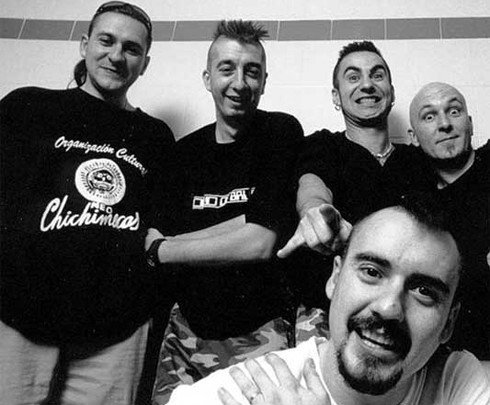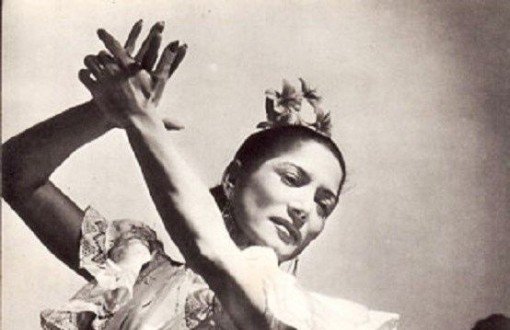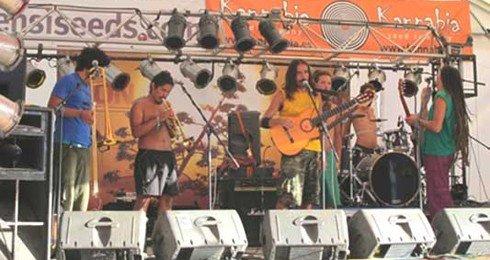"Negro africano, asiático oriental
indio americano, africano musulmán
blanco europeo, aborigen australiano,
cinco continentes en un mismo corazón
(African Black, Oriental Asian,
American Indian, African Muslim
White European, Australian Aborigine,
five continents come together in a Multicultural society)
MULTIRACIAL, MULTICULTURAL,
MULTIRACIAL, MULTICULTURAL"
It is through the message of the above song that Ska P (1), a musical band from Madrid, is such a powerful force in hosting countless concerts in Europe and Latin America. The song called 'Mestizaje' and its ska-punk rhythms speak of an intercultural society without borders.
The group was formed in Vallecas, a working class area in the suburbs of Madrid linked to the long struggle against Franco's dictatorship. All throughout their journey as a group, since the 90's, the punk band Ska P always seemed to have an objective in their music, focused on principles. Intercultural diversity has always been the focus of their music, even though the band members are only Spaniards.
Regardless, when Ska P speak of an intercultural society in the Iberic peninsula they do not only speak of a musical genre which goes beyond 'world music'. The song 'mestizaje' is the encounter of mixed cultures and the unexpected fruit it bears. The term is derived from the historical events of conquest, or rather the invasion of the Americas. With the arrival of Europeans and African slaves on the Latin American continent came the encounter with native Indians and the birth of many other races.
According to some researchers the term 'mestizaje' was adopted by the Latin American elite to cover up for the birth of racist developments. Nowadays 'mestizaje', in its most literal definition is - a pluralistic form of encounters between different cultures - and has become one of the strongest pillars of Hispanic culture.
The music especially that by younger generations, speaks of how different cultures mix in society, and in the light of immigration, their message is highlighting a phenomena which has immerged in an explosive way. Just like the French band Mano Negra, which made young people dream in the 80's with their personalized rhythms called patchanka, the immerging Spanish groups are using a language which favours intercultural encounters with great openness and no limits whatsoever.
The first to take the leap in this musical experience were Ojos de Brujo (2). The band was formed in the working-class areas of Barcelona. They are a reflection of a multicultural society they live and breathe in every corner of the city: barrios where for decades fused the rhythms of Andalusian migrants, and Latin-American, Asian, African or Eastern European music. The diversity in cultures brings to life "a parallel reality to that found in different parts of the city", explains Ramón Jiménez, the guitarist and the "soul" of the band Ojos de Brujo.
Ramón, a gypsy, who speaks of his suburban roots with passion, maintains that having grown in a humble and multicultural area made him more aware of different cultures : "We do not view diversity from an external point of view, that seen from an observer. I feel I am an integral part of this reality, this is my life", explains Ramón, who sustains the importance of "living ones dreams in the first person".
Techarì, the title of their third album, is probably the best term used to describe the band Ojos de Brujos. In fact, techari, in Calò language, is a gypsy idiom coming from Southern Spain, meaning "freedom": A family of 18 free musicians, indeed living their music.
In Spain the musical scene is in continuous development, and despite the enforcement of new legislation set by the local councils to cut down on disturbance caused by the music "por la calle", one still finds spaces to spontaneously create music.
Once again in Barcelona, despite being one of the strictest cities when it comes to legislation against street artists, witnesses the birth of jam-sessions on street pavements amongst musicians and sometimes involving the public. One of the specialised groups on street fiesta is Mañana me chanto (3), a group coming from Barcelona mixing styles like rumba, cumbia, ska, reggae, funk, salsa, rock or punk.
A truly nomadic band, "Mañana me chanto" consists of a number of musicians coming from all four corners of the world: Chile, Argentina, France and Switzerland. Only a Spaniard is missing in the group, but no one in the audience ever doubts their roots. If there is a group which has wandered thousands and thousands of miles, it is definitely them. These seven musicians crossed 25 countries in their van. The chanto family usually performs in three continents but when they get a chance to return to the old streets of Barcelona, they do so by hosting improvised concerts.
Apart from latin rhythms, in Spain, Arabic rhythms are unavoidable and have left a long-lasting influence on the flamenco culture. We can feel these rhythms in the music played by Yacine & Oriental Groove Ensemble. The group composes Algerian songs accompanied by a guitar and voice arrangement, Arabic poems sung to a melodic base arrangement of traditional instruments, to which electrical sounds are also added to.
Yacine Belahcene, born to an Algerian father and Spanish mother, describes his rock music as Arabo-mediterranean. His inspirations, apart those from his family, come from his travels to Algiers, Tangiers, Barcelona, Tripoli and Alexandria: "The Mediterranean is not only the cradle of diverse cultures - Yacine explains - "it's a great source of inspiration. We are a Mediterranean band playing Arabic rock music, whereby we mix traditional rock instruments like the electric guitar, bass and battery to Arabic and North African tunes.
Yacine & Oriental Groove Ensemble's music consists of darboukas, ouds, bangours and violin sounds. Yacine made the mestizaje language his music. He had already chosen their language like many other musicians, with whom he formed the first band in Barcelona, with his school friends in the Arabic quarter where they grew up. The band's name, Cheb Balowski, which in polish means "he who loves to dance".(ÇT)
---
Notes:
- (1) www.ska-p.com
- (2) www.ojosdebrujo.com
• (3) www.mananamechanto.com






